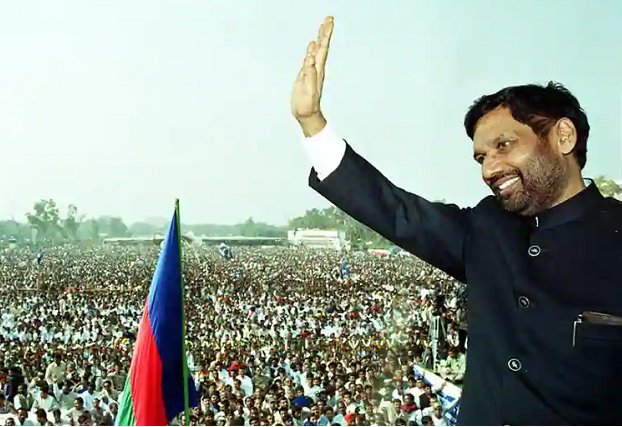A dalit face in Delhi for long time
Committed to social justice, dalit cause
Had the knack of sniffing at the winning side
Lalu called him weathervane
A dalit born in a poor family in a remote village of a backward State like Bihar living in a vast bunglow on Janpath for decades as a neighbor of the Congress chief Sonia Gandhi was an extraordinary leap. Ram Vilas Paswan, who had been a Central minister for more than half of his political career was a gifted politician of rare capabilities. The fact that two top politicians of the country who were never on the same page praised the qualities of Paswan’s mind and heart in their tributes is evidence enough. Prime Minister Narendra Modi said the death of Ram Vilas was an irreparable personal loss to him while Sonia Gandhi described the departed leader as a “towering personality who will be remembered for asserting the cause of social and political equality. President Ramnath Kovind also paid glowing tributes saying that Paswan was the voice of the oppressed and a champion of the cause of social justice.
Social Justice, the cornerstone
Social justice was the slogan Paswan started his long and distinguished political journey with. He was a socialist trained in anti-Congress school. After finishing his MA and LLB, he entered politics and defeated in the 1969 Assembly elections the sitting MLA, Mishri Siddha, who got elected every time since the first general elections in 1952. Contesting on SSP (Samyukta Socialist Party) ticket, the young Paswan became very popular with his dynamism and helping nature. He had the uncanny knack of sniffing at the winning side in politics. Lalu called him “Mausam Vaigyanic” (weathervane).
Paswan was arrested as soon as the Emergency was declared and was released only after the draconian law was lifted. He joined the Janata Party and contested to Lok Sabha in the 1977 elections from his native Hajipur constituency and won with a huge, record-breaking majority of 4.2 lakh votes, entering Guinness Book of World Records. He improved his own record in the 1989 elections by winning with five lakh votes majority. He was elected to Lok Sabha eight times and Rajya Sabha twice.
Working with 6 PMs
There were as many as eight prime ministers since 1989 when Paswan became a union minister for the first time in the Cabinet headed by V.P. Singh. Excepting Chandrasekhar and P.V. Narasimha Rao, Paswan had worked with rest of all the six prime ministers – V.P.Singh, H.D. Deve Gowda, I.K. Gujral, Atal Behari Vajpayee, Dr. Manmohan Singh and Narendra Modi. He had been an affable dalit face from Bihar in Delhi after Jagjivan Ram.
Paswan was a staunch anti-Congress politician from Socialist school. He had resigned from Vajpayee government in 2002 after the Godhra incident which was followed by riots in Gujarat under Modi’s watch. He had no problem in joining the UPA dispensation at Sonia’s invitation and to be a minister in the Cabinet headed by the very same Modi. His flexible attitude and cheerful demeanor made him an acceptable colleague. He left Janata Dal in 2000 to found his own Lok Janshakti Party (LJP).
Three Musketeers of Bihar
For that matter, the three Musketeers of Bihar socialist politics, Lalu Prasad Yadav, Nitish Kumar and Ram Vilas Paswan, have been opportunistic in their politics. Lalu, in comparison, gets better marks for sticking to alliances. His Rashtriya Janta Dal (RJD) entered into an alliance with the Congress party and had stuck to that. He had partnered with Nitish Kumar in 2015, but both of them knew that it was not destined to last long. But Lalu did not desert the Congress. Nitish, on the other hand, had deserted the BJP in 2013 and the RJD and the Congress in 2017. He also allowed the LJP to go out of the NDA in Bihar in 2020 making it clear that he has no sentiments. Paswan, on his part, had partnered with the BJP and the Congress besides the National Front and the United Front.
Mandal reservations, Bharat Ratna for Ambedkar
Whichever the government, Paswan was steadfast on two issues – social justice and dalit cause. He was instrumental as a welfare minister in V.P. Singh Cabinet in implementing the recommendations of Mandal Commission in spite of widespread protests by the upper castes. He played a major role in getting Bharat Ratna for B.R. Ambedkar posthumously. While the highest civilian award was constituted in January 1954, it was left for V.P. Singh to declare the award for the most deserving leader after 36 years on 31 March 1990. Paswan also played a stellar role in neutralizing the effect of the Supreme Court ruling on 28 March 2018 on the SC & ST Atrocities (Prevention) Act, 1989. He convinced Prime Minister Modi to introduce a Bill in Parliament in August 2018 to make the Act more powerful. The Bill sought to insert section 18(1)(c ) in the 1989 Act that says a “preliminary enquiry shall not be required for registration of an FIR against any person.” The Bill also inserted another section 18 (1)(b) which says “the investigating officer shall not require approval of the arrest, if necessary, of any person against whom an accusation of having committed an offence under this act has been made and no procedure, other than what provided under the Act or the Code, shall apply. No anticipatory bail to be given to the accused.” This was the result of Paswan’s unwavering commitment to social justice.
The way Chirag, the junior Paswan, has been running the party, campaigning against Chief Minister Nitish Kumar who is supposed to be battling against three-term anti-incumbency, indicates that the senior Paswan’s political legacy is in safe and sturdy hands.
More News about Bihar Elections :




